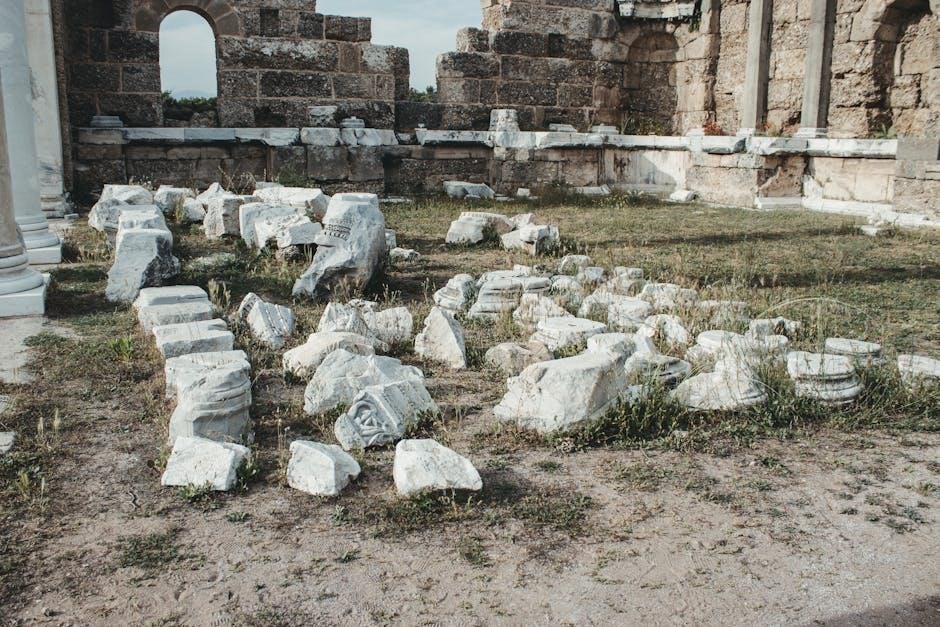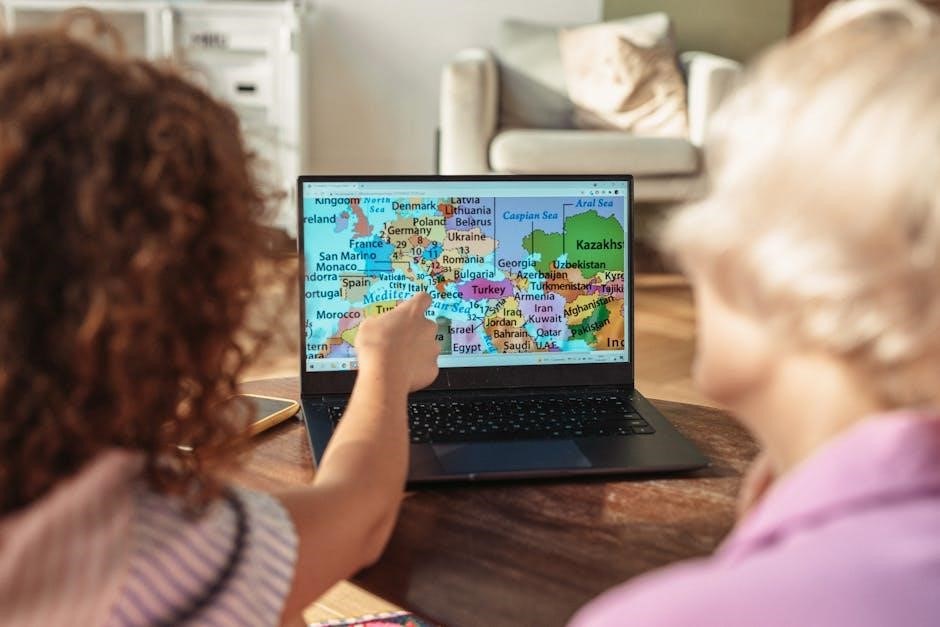fragments heraclitus pdf
Heraclitus, a pre-Socratic Greek philosopher, is known primarily through his fragments, which offer glimpses into his profound thoughts on the universe and human nature. These fragments, though incomplete, remain essential for understanding his philosophy, emphasizing flux, logos, and the harmony of opposites, influencing both ancient and modern thought.
1.1 Historical Context of Heraclitus’ Philosophy
Heraclitus, a pre-Socratic Greek philosopher, flourished around 500 BCE in Ephesus, a city in ancient Anatolia. His philosophy emerged during a period of intellectual and cultural transformation in the Greek world, marked by the rise of rational inquiry and debates about the nature of reality. Heraclitus’ ideas contrasted with those of his contemporaries, such as Parmenides, who emphasized stability and unity. Heraclitus, in turn, focused on the dynamic and ever-changing nature of the universe, encapsulated in his famous concept of flux; His works, preserved only in fragments, reflect his unique voice and critical approach to traditional wisdom, offering insights into the harmony of opposites and the universal principle of logos.
1.2 The Significance of Heraclitus’ Fragments
Heraclitus’ fragments are remnants of his philosophical works, offering profound insights into his unique worldview. Despite their brevity and obscurity, these fragments are invaluable for their exploration of universal principles such as flux, logos, and the harmony of opposites. They capture Heraclitus’ critique of conventional wisdom and his emphasis on the interconnectedness of all things. The fragments also showcase his poetic and enigmatic style, which has fascinated scholars and philosophers for centuries. Their significance lies in their ability to provoke deep reflection on the nature of reality, change, and human understanding. As fragments, they challenge interpreters to reconstruct meaning, making them a rich subject for philosophical inquiry and debate.
The Content and Structure of Heraclitus’ Fragments
Heraclitus’ fragments explore themes of flux, logos, and the harmony of opposites, offering insights into cosmic and human realities. Their disjointed nature requires interpretive reconstruction.
2.1 Key Themes in Heraclitus’ Philosophy
Heraclitus’ philosophy revolves around the concept of flux, emphasizing that change is the fundamental nature of reality. His famous assertion that “no man ever steps in the same river twice” underscores this idea. Central to his thought is the principle of logos, a universal, rational order governing the cosmos. He also explores the harmony of opposites, arguing that discord and concord are interdependent, leading to the “fairest harmony.” Additionally, Heraclitus delves into the nature of the soul, advocating for self-inquiry to understand one’s true essence. His fragments challenge readers to embrace paradox and the unity of opposites, offering insights into both the macrocosm of the universe and the microcosm of human existence.

2.2 The Role of Logos in Heraclitus’ Teachings
In Heraclitus’ philosophy, logos serves as the universal, rational principle governing the cosmos. It represents the underlying order and intelligence of the world, accessible through human reason. Heraclitus often uses logos to describe the divine law or wisdom that structures all existence. He emphasizes that true understanding comes from grasping this principle, which unites all things in harmony. The concept of logos is central to his teachings, as it explains the interconnectedness of opposites and the dynamic balance of the universe. Heraclitus encourages individuals to align their souls with this universal reason, fostering a deeper understanding of reality and their place within it. Through logos, Heraclitus bridges the gap between the individual and the cosmos, offering a pathway to wisdom and enlightenment.

Challenges in Interpreting Heraclitus’ Fragments
Heraclitus’ fragments are fragmented and open to multiple interpretations, making his philosophy challenging to reconstruct. Translation difficulties and lack of context further complicate understanding his original intent.
3.1 The Fragmented Nature of Heraclitus’ Works
Heraclitus’ philosophy survives only in fragments, scattered across secondary sources, without the original context or structure; This makes it difficult to reconstruct his exact ideas, as the fragments lack continuity. The absence of a unified manuscript forces scholars to piece together his thoughts from disparate references, leading to diverse interpretations. Additionally, the fragments’ brevity and poetic style further complicate efforts to discern Heraclitus’ intended meaning. This fragmented nature has led to ongoing debates about his philosophy’s coherence and scope, highlighting the challenges of interpreting his work accurately. Despite these obstacles, modern editions and translations aim to compile and clarify the fragments, offering insights into his profound ideas.
3.2 Difficulties in Translating Heraclitus’ Texts
Translating Heraclitus’ fragments poses significant challenges due to their poetic and often ambiguous nature. The original Greek text is concise, with phrases open to multiple interpretations. Additionally, the lack of context in fragmented sentences complicates capturing Heraclitus’ intended meaning. The ancient Greek language’s nuances, such as obsolete terms and stylistic peculiarities, further hinder accurate translation. Scholars must navigate the delicate balance between preserving the philosophical depth and ensuring linguistic clarity. Different translators often arrive at varying interpretations, especially with key concepts like “logos,” which can mean reason, word, or order. These challenges highlight the need for careful analysis and expertise in both philosophy and classical Greek to produce reliable translations that reflect Heraclitus’ original ideas.
Sources and Transmission of Heraclitus’ Fragments
Heraclitus’ fragments are preserved through ancient sources like Diels-Kranz and modern editions such as the 1877 Oxford collection, ensuring their transmission for scholarly study and analysis.
4.1 Ancient Sources Quoting Heraclitus
Ancient sources quoting Heraclitus include philosophers like Plato and Aristotle, who referenced his ideas. The most notable collection is Diels-Kranz’s Die Fragmente der Vorsokratiker, which compiles fragments from various ancient texts. Heraclitus’ works were also preserved in later philosophical writings and commentaries. For example, the Stoics often cited his concepts of logos and the harmony of opposites. Additionally, early Christian scholars incorporated some of his ideas into their theological discussions. These ancient references provide valuable context for interpreting Heraclitus’ philosophy, even though his original works are now lost. Modern scholars rely on these secondary sources to reconstruct his teachings, ensuring his ideas remain accessible for study and analysis.
4.2 Modern Collections and Editions of the Fragments
Modern collections of Heraclitus’ fragments have made his philosophy more accessible. Notable editions include Diels-Kranz’s Die Fragmente der Vorsokratiker, which systematically organizes the fragments. Charles H. Kahn’s The Art and Thought of Heraclitus provides parallel Greek texts with translations, offering deep insights. William Harris’s work includes a complete translation and commentary, aiding scholars. These editions often include Greek texts, translations, and commentaries, helping readers engage with Heraclitus’ ideas. Digital versions and critical editions further enhance accessibility. These resources are invaluable for understanding Heraclitus’ philosophy, ensuring his fragments remain a vital part of philosophical study and discourse.

Philosophical Influence of Heraclitus’ Fragments

Heraclitus’ fragments profoundly influenced ancient Greek philosophy and modern thought, inspiring thinkers like Hegel and Nietzsche. His ideas on flux and logos remain central to philosophical discourse, shaping metaphysics, epistemology, and the concept of change, while his emphasis on harmony in opposites continues to inspire contemporary debates.
5.1 Impact on Ancient Greek Philosophy
Heraclitus’ fragments had a profound impact on ancient Greek philosophy, influencing major figures like Parmenides, Plato, and the Stoics. His concept of the unity of opposites challenged static views of reality, while his emphasis on logos as a universal principle shaped metaphysical and epistemological debates. Parmenides’ notion of being may have been a response to Heraclitus’ flux, while Plato integrated elements of Heraclitus’ thought into his theory of forms. The Stoics embraced Heraclitus’ ideas on the interconnectedness of all things and the cyclical nature of the cosmos. His philosophy became a cornerstone of Western thought, fostering a dynamic understanding of reality that continues to resonate through ancient and modern traditions alike, ensuring his enduring relevance in philosophical discourse.

5.2 Heraclitus’ Influence on Modern Thought
Heraclitus’ fragments have profoundly influenced modern thought, shaping various fields from philosophy to science and art. His concept of flux and the unity of opposites inspired existentialist and dialectical philosophies, while his idea of logos as a universal principle resonates in modern metaphysics. The harmony of opposites is reflected in Hegel’s dialectics and Marxist theory, emphasizing change and conflict as drivers of progress. In science, Heraclitus’ vision of a dynamic cosmos aligns with theories of relativity and quantum mechanics. His philosophy also appears in art and literature, such as in Christopher Nolan’s Inception, which explores themes of harmony and discord. Modern editions of his fragments, like those by William Harris, ensure his ideas remain accessible and relevant, continuing to inspire new generations of thinkers and creators.

Study Resources for Heraclitus’ Fragments

Essential resources include editions like The Art and Thought of Heraclitus by Charles H. Kahn and William Harris’ complete fragments with commentary, offering Greek texts and translations.

6.1 Essential Editions of the Greek Text
For scholarly study, essential editions of Heraclitus’ fragments include Die Fragmente der Vorsokratiker by Diels-Kranz, providing a comprehensive collection of authenticated fragments. Another key resource is Heraclitus: The Complete Fragments, edited by William Harris, which offers a Greek text with commentary. These editions are indispensable for understanding the original context and philosophical depth of Heraclitus’ teachings. Additionally, The Art and Thought of Heraclitus by Charles H. Kahn presents parallel Greek texts and translations, aiding both researchers and newcomers. These works ensure access to Heraclitus’ ideas in their most authentic form, preserving the nuances of his philosophy for modern scholars and enthusiasts alike.
6.2 Recommended Translations and Commentaries
For a deeper understanding of Heraclitus’ fragments, several translations and commentaries are highly recommended. Charles H. Kahn’s The Art and Thought of Heraclitus offers a meticulous translation with insightful commentary, providing clarity to Heraclitus’ enigmatic statements. Another invaluable resource is Heraclitus: The Complete Fragments, edited by William Harris, which includes the Greek text, a facing-page translation, and detailed commentary. Additionally, G.W.F. Hegel’s interpretation of Heraclitus in his Lectures on the History of Philosophy provides a philosophical perspective, highlighting Heraclitus’ influence on dialectical thought. These works are essential for scholars and enthusiasts seeking to engage with Heraclitus’ ideas in depth, offering both linguistic accuracy and philosophical insight into his profound teachings.
Heraclitus’ fragments remain a cornerstone of philosophical inquiry, offering timeless insights into the nature of reality, change, and the human condition. Despite their brevity, these fragments have profoundly influenced both ancient and modern thought, shaping ideas about flux, logos, and the harmony of opposites. Their enduring relevance lies in their ability to provoke reflection and inspire new interpretations across disciplines. As seen in works like Heraclitus: The Complete Fragments and The Art and Thought of Heraclitus, modern scholarship continues to illuminate the depth and complexity of his philosophy. For scholars and enthusiasts alike, Heraclitus’ fragments are not just historical artifacts but living texts that invite exploration and contemplation, ensuring their continued significance in the study of philosophy and beyond.












Leave a Comment